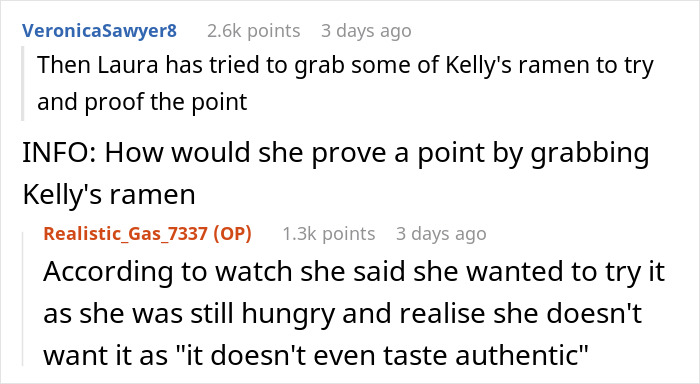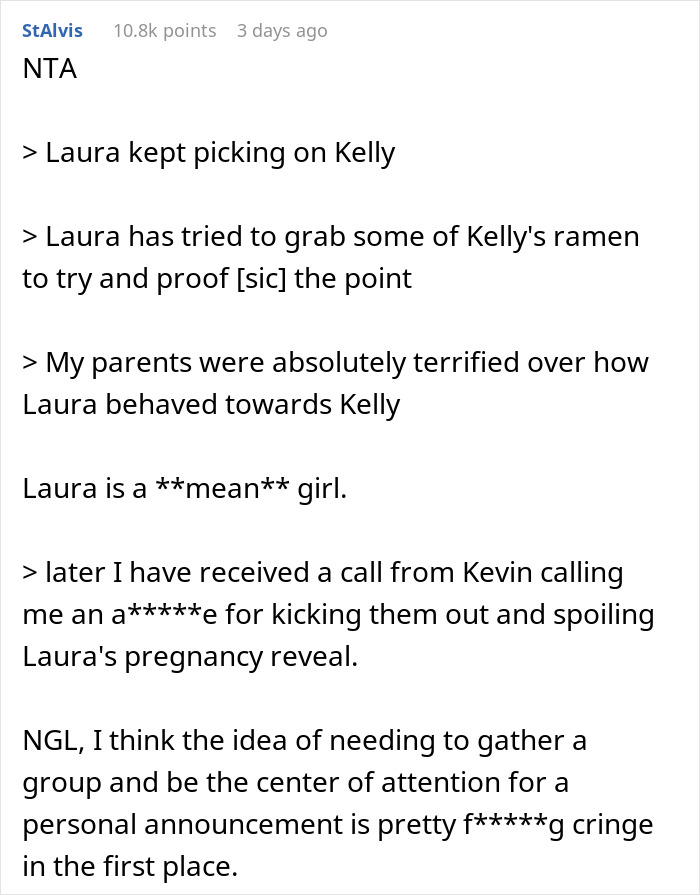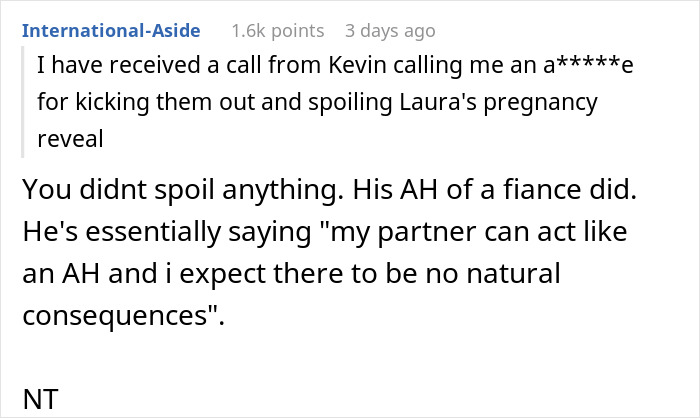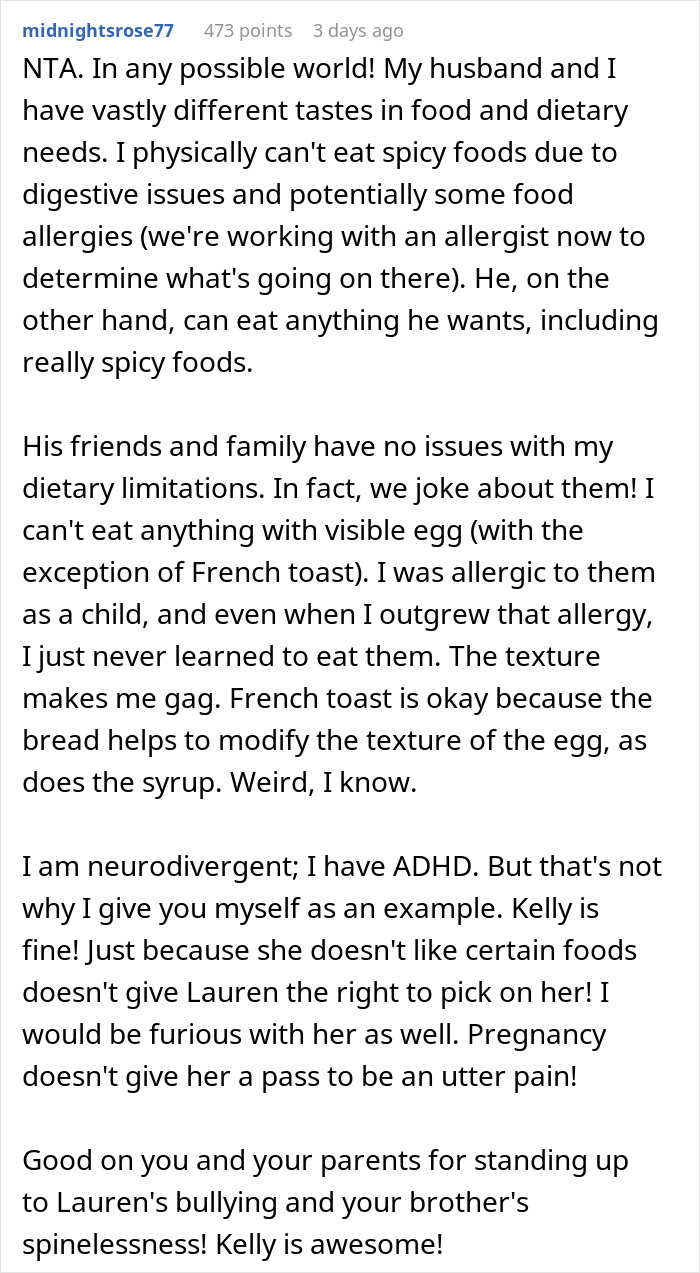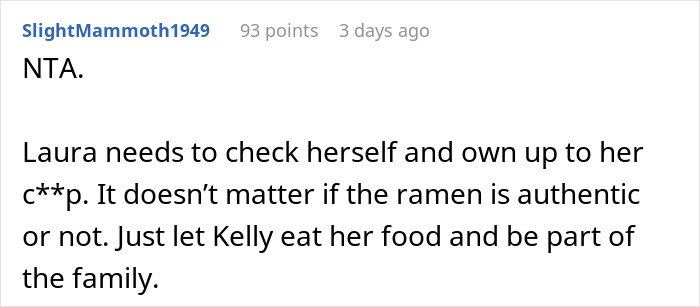Food can be the thing that builds bridges between people. For example, people can enjoy certain types of food and build relationships over that enjoyment. At the same time, it can also be the thing that damages or ruins these bridges. Like when someone doesn’t like certain food and that, for some reason, annoys another person very much.
Today’s story is about a similar situation, where an autistic woman was bullied for having sensory issues related to food. Her bully was kicked out for her actions, and it turned into a “who’s the jerk here?” situation.
More info: Reddit
How should you react when you see your loved one picked on just because they have food-related sensory issues?

Image credits: Viridiana Rivera (not the actual photo)
A similar question was asked by the man who witnessed his autistic girlfriend being teased by his brother’s fiancée because she didn’t eat “authentic” ramen
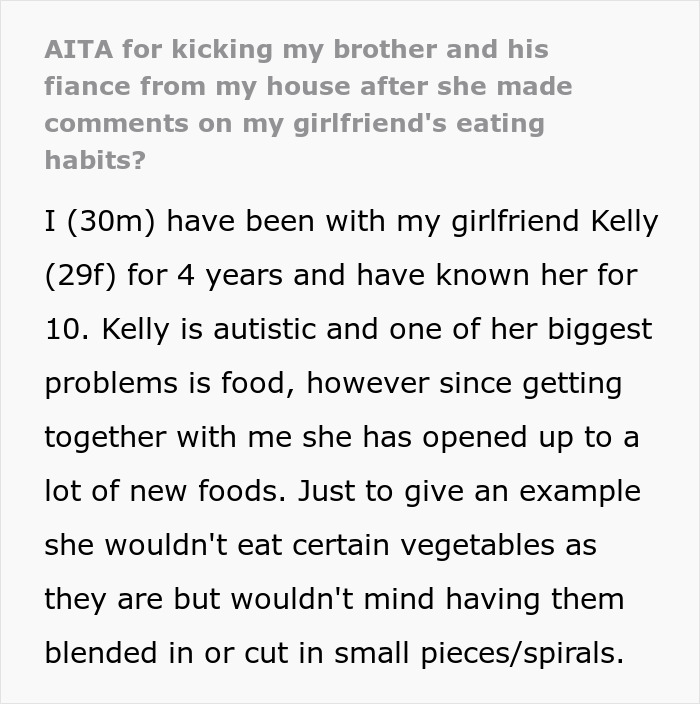


Image credits: August de Richelieu (not the actual photo)
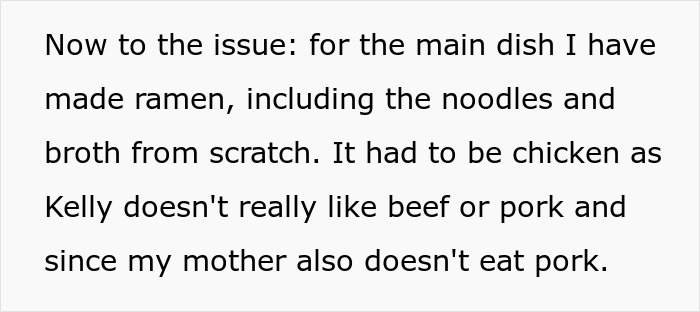

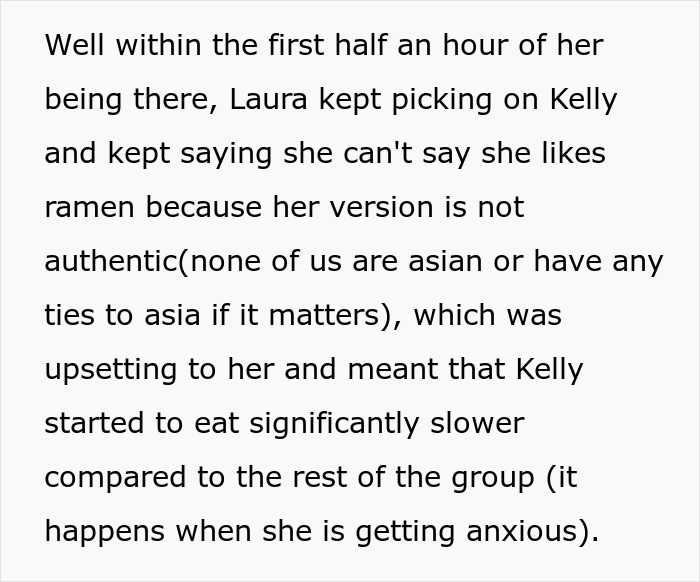

Image credits: Andrea Piacquadio (not the actual photo)


Image credits: u/Realistic_Gas_7337
After the teasing ended in tears, the man kicked out his brother and his fiancée from his house, and he later got blamed for ruining their big announcement
The post’s author’s girlfriend, whom he called Kelly in the story, is autistic. One of her biggest sensory triggers is food. For example, she can’t eat certain vegetables as they are, but she doesn’t mind having them incorporated into the meal in other ways.
The OP’s brother, Kevin, recently got engaged to his girlfriend Laura. So, they came for dinner at the post author’s house, saying they had something to announce.
The man made a Japanese-themed dinner. The main dish was ramen made from scratch. And since his girlfriend doesn’t like beef or pork and his mother doesn’t eat pork, he made it with chicken. To Kelly’s portion, he also added some extra vegetables instead of eggs, which she’s not fond of. Everyone else had the standard meal.
During the first half an hour of the dinner, Laura kept picking on Kelly. She kept saying that Kelly can’t say she likes ramen, as her version was not authentic. The OP noticed how upset Kelly got by how she started to eat way slower than everyone else, which is one of her signs of anxiety.
Laura also tried to take some of Kelly’s ramen to prove her point, which distressed the woman even further. So, it’s no shock that it all resulted in an argument between the women, leading to tears.
After that, the OP asked his brother and his fiancée Laura to leave. Even the parents were horrified over Laura’s behavior and hinted she should apologize. Later that evening, the post’s author received a call from his brother calling him a jerk for kicking them out. Apparently, they were planning to reveal Laura’s pregnancy, and their announcement was ruined.
People online were completely sure who the actual jerk in the situation was — and it wasn’t the OP or Kelly. Of course — it was Laura. They dubbed her a “mean girl,” as she couldn’t stop picking on Kelly just because she has sensitivities to certain foods. As netizens said — not liking certain foods or having sensory issues with them doesn’t mean that you should be picked on.
For a broader understanding of autistic people’s sensory issues related to food, Bored Panda reached out to autism advocate Kaelynn Partlow. Check out her Instagram, YouTube, and Nonprofit organization!
Kaelynn voiced that when people think about sensory issues related to food, they usually think about taste. Yet, it’s not the only thing that can be related to an individual’s food sensitivities. According to her, the person can have food sensory issues related to:
- Taste;
- Smell;
- Texture;
- Visual stimuli.
Kaelynn also added: “It’s worth noting that it’s not our actual abilities to smell, touch, taste, hear, or see themselves that are heightened. Rather, it’s our brain’s interpretation of those senses that is ‘turned up’ to a higher level than in most neurotypical people’s brains. When people say autistic brains are ‘wired differently,’ this is part of what they mean.”

Image credits: Karolina Grabowska (not the actual photo)
These heightened interpretations can cause “extreme” or “unexpected” reactions to certain foods. If a person’s brain is sensorily overwhelmed by that food item, it can quickly turn into an aversion to it. “These aversions can manifest in a variety of reactions. Some people may tolerate being near aversive foods, others may decline aversive foods when offered, and others may have strong reactions to being anywhere near the food.” Typically, aversions are influenced by the levels of abilities in areas such as communication, emotional regulation, and problem-solving skills.
In Kaelynn’s words: “For a neurotypical person, the smell of steamed veggies may be equivalent to having a tab open on a computer. They notice it, but they can shift to other tabs and concentrate on other things. For a person on the autism spectrum, the smell may be interpreted as so intense that their computer freezes on the steamed veggie tab and causes them to be unable to concentrate on anything else.”
The autism advocate says that forcing a person to tolerate an element of foods they find aversive can be physically painful to them. “When interacting with autistic people, I would urge you to be sensitive to this and respect the ‘no’ when someone declines certain foods.”
It should be noted that having a sensory sensitivity is not equal to being a picky eater. It’s way deeper than that. Being a picky eater means being unwilling to try out new foods and eating only familiar ones. Having sensory issues related to food means that people on the spectrum usually experience “mild” things as overwhelmingly, and it can even be suffocating for them.
The autism advocate also notes: “Much like other sensory-related disabilities, such as vision or hearing impairments, sensory sensitivities are not a choice. In the same way a vision-impaired person could not see better if they ‘just tried harder,’ an autistic person could not overcome their sensory challenges simply by putting in more effort to do so.”
According to Kaelynn, accommodations for food-related sensory challenges are individualized for each person. Some prefer to eat in a separate area to avoid all the triggers, while others can tolerate the triggers as long as it doesn’t touch their plates. There are people who can also tolerate aversive stimuli by using distractions, for example, watching a video or using a fidget tool.
The autism advocate added a story from her personal experience: “As someone who was diagnosed with autism myself when I was 10, I personally find it helpful to have a heads-up when aversive sensory stimuli is going to be present. For example, if my roommate plans on making asparagus, I appreciate knowing that ahead of time, so I can light a candle, turn the fan on, or open the door to let it air out.”
Speaking of the stigma that people who have sensory issues with food experience, it is often believed that these individuals will eat these foods when “they’re hungry enough.” Kaelynn stated that this belief is untrue and, in fact, dangerous. She recalled several instances where this belief led to the autistic person being hospitalized, as they didn’t eat “when they were hungry enough.” They just didn’t eat at all. “Sensory differences are not something to be downplayed or dismissed because ignoring them can result in serious and occasionally life-threatening consequences.”
She also noted that the therapy for food sensory sensitivities should be left to professionals. Family and friends shouldn’t host interventions at mealtimes for the autistic individual. They should simply be supportive of them.
With this thought in mind, we could say that Laura from the story really messed up. Maybe she thought that she was having some sort of “intervention” for Kelly, but still, it was a really poor choice. Just as people online said — picking on someone just due to their eating preferences is a jerk move.
People online unitedly decided that the bully was a “mean girl” and she was very wrong to act the way she did
